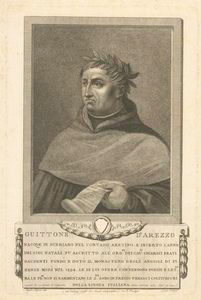<Back to Index>
- Poet Guittone d'Arezzo, 1235
PAGE SPONSOR

Guittone d'Arezzo (Arezzo, c. 1235 - Bologna , 1294) was an Italian poet and a member of the Order of Friars of the Blessed and Glorious Virgin Mary.
Son of Viva Michele, chamberlain of the City, he was a passionate partisan of the faction of Guelph and in 1256, because of his political sympathies, he was exiled for several years from Arezzo.
Embittered by too many disagreements, around 1265, seized by a strong spiritual crisis, he left his wife and children and joined the newly established religious order of the Friars of the Blessed Virgin Mary Gloriosa (the so-called Brothers revelers).
From his works, and especially by the reading of his letters, the picture emerges of a strong personality and great culture. Despite harsh criticism leveled against him by Dante, his knowledge and studies were of a high level. In particular, his output shows that Guittone had a thorough knowledge of Sicilian opera and that he mastered thoroughly the great troubadours.
His songbook is particularly rich, the body has in fact 50 songs and 251 sonnets, preserved in manuscripts of Italian origin and where the code Laurentian Rediano 9, which brings together poems of love and political songs, is the most important witness. Some of his compositions
have not survived, but are known through the Giuntina of Rime. Most famous is the lament Alas, concerning the battle of Montaperti in 1260. The Laurentian code exhibits love sonnets of Guittone, which in some respects anticipate the structure of Petrarch and in others show influences inherited in part by the troubadour tradition.
In the vast work of Guittone there are also about 50 letters of civil and courteous argumentation.
Guittone has left an important legacy as both a troubadour and a Sicilian, due to the incompatibility between the vision of courtly love and Christian morality. In his view, in fact, all the love poetry was simply a ploy to satisfy his sexual desire.
Until his entry in the order of friars revelers, one can identify a period of "youth" in which there is denunciation of the courtly love. Love is seen as a "disease" from which one can and must heal (series of 12 sonnets on 'Ars Amandi').
In his more mature phase, Guittone, without renouncing his animosity assumed a demeanor more moralizing, pointing more to catechesis and education of the audience. The songs become of a more ascetic tone, and are composed also of praise.
From a technical standpoint, Guittone is probably the most influential poet in the thirteenth century Tuscany, probably setting the benchmark for many other poets and representing undoubtedly the main inspiration of the first poetic attempts of the young Dante Alighieri. The critics have spoken of a school guittoniana or guittonismo, as opposed to that of the end of the thirteenth century of Provencal poetry. It is a style always highly technical and difficult, characterized by certain troubadour features and by experimentation in the modification of the canonical metric forms.
Among the main contributors of this guittoniana style, in addition to the young Dante Alighieri, are Andrea Monti and Luce Davanzati.